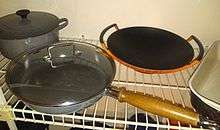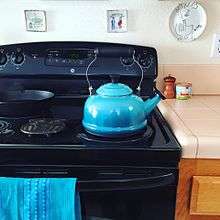Le Creuset
|
| |
| SAS | |
| Industry | Cookware |
| Founded | 1925 |
| Founder |
Armand Desaegher Octave Aubecq |
| Headquarters | Fresnoy-le-Grand, France |
| Owner | Paul Van Zuydam |
| Website | lecreuset.com |

Le Creuset (French pronunciation: [lə kʁøze], meaning "the crucible") is a premium French cookware manufacturer best known for its colorfully-enameled cast-iron cookware "French ovens", also known as "casseroles" or "Dutch ovens". The company also makes many other types of cookware, from sauce pans to tagines.
History
Le Creuset was founded in the French town of Fresnoy-le-Grand, Aisne, Picardy, a strategic location at the crossroads of transportation routes for iron, coke and sand. Armand Desaegher (a casting specialist) and Octave Aubecq (an enameling specialist) opened their foundry in 1925.[1][2] That same year, the first cocotte (or French Oven) was produced, laying the foundation for what is now an extensive range of cookware and kitchen utensils.
The Le Creuset signature color, Flame (orange) was born in this first piece. With their new ability to pigment the enamel glaze, Desaegher and Aubecq modeled their first color after the intense orange hue of molten cast iron inside a cauldron ("creuset" in French).
During World War II, Le Creuset began to focus on continually improving their cast iron. In 1939, In 1957, Le Creuset purchased a competitor, Les Hauts Fourneaux de Cousances, and began producing items such as a grill model and a fondue set.
In 1995 Le Creuset began exploring new product categories: stainless steel, stoneware, silicone, enamel on steel, textiles and forged hard-anodized aluminum.
The current Le Creuset logo was introduced in 1970 and was designed to be a symbolic representation of metal casting and molding. The company was purchased by current owner Paul Van Zuydam in 1987.
Le Creuset offers a variety of colors, from bright (e.g. cherry, a red gradient) to muted (e.g. dune, a graduated off-white).[3] Its discontinued colors include cobalt (solid blue), black onyx (black), kiwi (solid green),[3] as well as slate, granite, cactus, and citron.[4][5]
Production

To manufacture their cast iron cookware, the Le Creuset foundry uses standard sand casting methods. After hand finishing, items are sprayed with at least two coats of enamel. The enamel becomes resistant to damage during normal use. Currently, all Le Creuset cast iron cookware is still manufactured in the company's foundry in Fresnoy-le-Grand, where workers employ a 12 step finishing process implemented by 15 different pairs of hands to ensure that there are no flaws or imperfections in the final product.
However, Le Creuset products that are not cast-iron may be made in other countries, such as China (accessories or silicone products), Thailand (kettles and ceramics), England (enamel cleaner), and Portugal (stainless steel)..
Le Creuset cookware is warranted by Le Creuset to be free from defects in material and workmanship at the time of its purchase. For this Lifetime Limited Warranty to apply, you must follow the care and use instructions provided with the utensil. This warranty covers normal household use only.[6]
References
- ↑ "Best Known French Cookware Brands - Le Creuset Cookware". www.thecookwarereview.com. Retrieved 22 May 2016.
- ↑ Guardian, David Levene for the (7 September 2015). "Le Creuset celebrates 90 years - in pictures". the Guardian. Retrieved 22 May 2016.
- 1 2 "True Colors". Cookware.lecreuset.com. Retrieved 2014-04-18.
- ↑ "Kitchen Classic Conundrum: What Color Is Your Le Creuset?". Epicurious.com. Retrieved 2014-04-18.
- ↑ "Where can I find discontinued colors of Le Creuset? - Cookware - Chowhound". Chowhound.chow.com. 2010-11-26. Retrieved 2014-04-18.
- ↑ http://www.qvc.com/footers/cd/pdf/K42842_FAQs.pdf